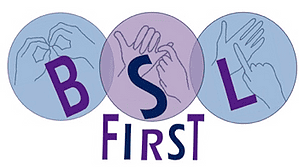What training and qualifications did you have before you joined the INT course?
Before joining the course, I had achieved my BSL Level 6 qualification with Signature. I also had a degree in Special Educational Needs and Inclusion Studies, and Qualified Teaching Status.Why did you choose BSL First over other training providers?
BSL First was one of the few interpreter training providers in London and offered their courses at a competitive rate. As well as this, their training dates were on weekends which allowed me to fulfill my other work commitments while training.
What do you feel were the benefits of the INT course?
I believe the benefits of the course were the expertise of the teaching staff, a focus on both theoretical and practical skills, the library of resources and the community of trainee interpreters who I learned with. The staff at BSL First had a robust understanding of the theory and taught this in a way that was accessible for us. This equipped us to complete the qualification’s written tasks, critically analyse our interpreting practice and inform our decision making when working. We had access to an extensive list of resources available anytime using Moodle, which included learning of theory and exercising practical skills. The cohort that I had were incredibly supportive and became my interpreting family through my training!
What was your learning experience like?
Overall, I had a positive learning experience! The course is rightfully challenging as a professional qualification so I think it’s important to be realistic and acknowledge that. However, the course was well structured and allowed us to feel we were progressing naturally – I remember as we entered the second year, my cohort collectively reflected on the year prior and couldn’t believe how much we had learned in that time. The use of technology like Moodle and Panopto to support our learning was really effective.What’s next for you in your interpreting career?
Now that I have achieved RSLI status, I am planning to build on my interpreting skills and begin working in some new domains such as medical, and the arts. BSL First has given me the skills to approach this safely.
